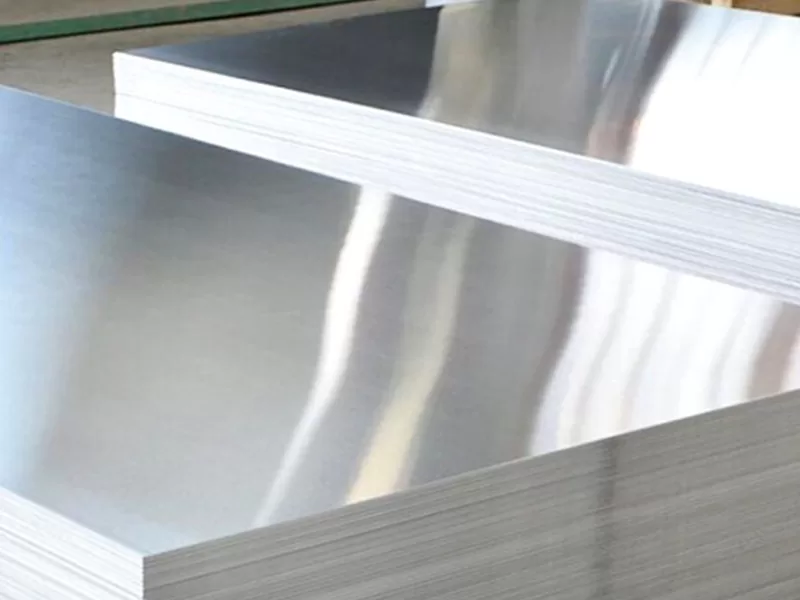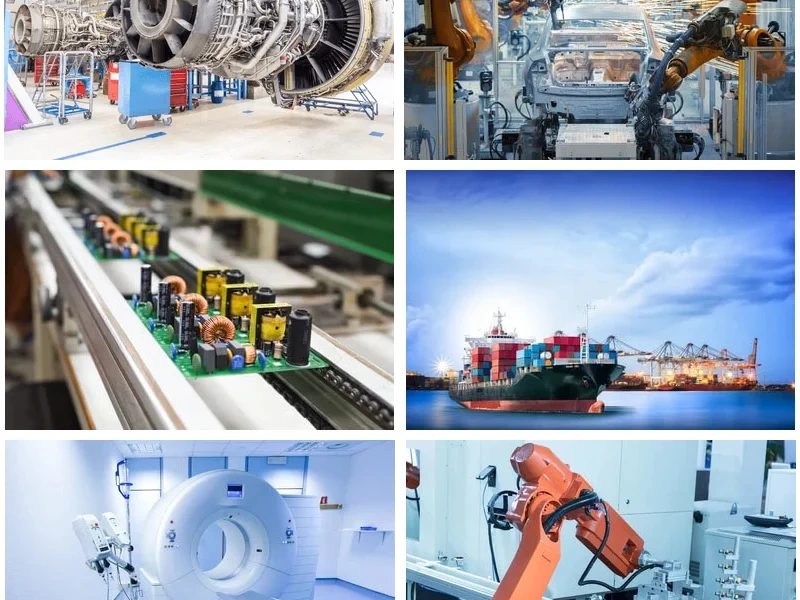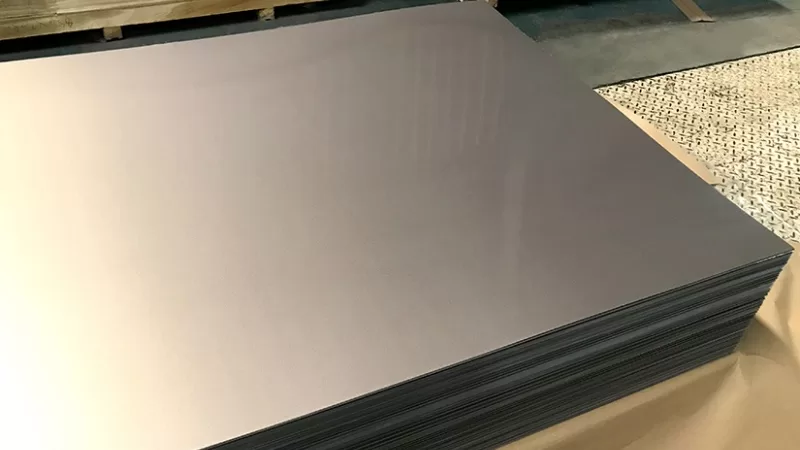Aluminium sheets are versatile metal panels known for their lightweight, durability, and corrosion resistance.




Standard Parameters
| Property | Details |
|---|---|
| Thickness | 0.2mm (foil) to 6mm (plate) |
| Width | Up to 2,500mm |
| Alloys | 1050, 3003, 5052, 6061 |
| Temper | O (annealed), H12-H19 (hardened) |
| Finish | Mill, anodized, painted, embossed |
Types




1. Plain Aluminium Sheet
- Smooth surface for general fabrication
- Used in packaging, electronics, and DIY projects
2. Embossed Aluminium Sheet
- Textured patterns (diamond, stucco, checker plate)
- Applications: Flooring, stair treads, decorative panels
3. Perforated Aluminium Sheet
- Punched holes for ventilation & filtration
- Uses: Machine guards, architectural screens
4. Composite Aluminium Panel
- Sandwich structure with polyethylene core
- Ideal for building facades and signage
Major Industrial Applications




1. Transportation Industry
- Aerospace: Aircraft skins, wing panels (alloy 2024, 7075)
- Automotive: Body panels, heat shields (alloy 5052, 6061)
- Marine: Boat hulls, decks (alloy 5083, 5086)
- Rail: Train exteriors, interior panels
2. Construction & Architecture
- Building Facades: Composite panels, curtain walls
- Roofing & Cladding: Corrugated sheets, standing seam roofs
- Windows & Doors: Frames, thresholds
- Interior Design: Ceiling panels, decorative elements
3. Electrical & Electronics
- Heat Sinks: For computers, LED lights
- Capacitor Foil: Ultra-thin 0.006mm foil
- Transformer Windings
- Electromagnetic Shielding

Consumer & Specialty Applications
Packaging Solutions
- Food containers
- Beverage cans
- Pharmaceutical packaging
- Flexible packaging foils
Household & DIY Uses
- Cookware and bakeware
- DIY projects and crafts
- Signage and nameplates
- Art and sculpture materials
Frequently Asked Questions
Q: What’s the difference between 3003 and 5052 aluminium sheets?
A: 3003 offers good formability while 5052 provides higher strength and better corrosion resistance, especially in marine environments.
Q: Can aluminium sheets be used for outdoor applications?
A: Absolutely. Anodized or painted aluminium sheets are excellent for outdoor use due to their weather resistance.
Q: How does aluminium compare to steel for construction?
A: Aluminium is about 1/3 the weight of steel, doesn’t rust, and is easier to work with, though generally more expensive.
What Are the Applications of Aluminium Sheet?
1. Construction & Architecture
- Roofing & cladding (lightweight, weather-resistant)
- Window frames & doors (corrosion-free, low maintenance)
- Ceiling panels (modern aesthetics, easy installation)
2. Transportation
- Aircraft fuselage & marine components (high strength-to-weight ratio)
- Car body panels & truck trailers (fuel efficiency)
- Railway interiors (fire-resistant properties)
3. Industrial & Manufacturing
- Heat sinks & electrical enclosures (excellent thermal conductivity)
- Conveyor belts & machine guards (durable, non-sparking)
- Chemical tanks (resistant to corrosion)
4. Consumer Goods
- Kitchenware (pans, baking trays) (non-toxic, heats evenly)
- LED light housings (heat dissipation)
- Signage & nameplates (customizable, long-lasting)
5. Packaging
- Beverage cans & food containers (hygienic, recyclable)
- Pharmaceutical foil (barrier against moisture/light)
What Can Aluminum Sheets Be Used For?
Aluminium sheets are one of the most adaptable materials in engineering. Here’s why:
✅ DIY Projects: Crafting, model making, home decor
✅ Renewable Energy: Solar panel frames, wind turbine parts
✅ Art & Design: Sculptures, engraved artwork, exhibition displays
How to Use an Aluminium Sheet?
- Cutting: Use tin snips (thin sheets) or CNC machines (precision cuts)
- Bending: Fold with a brake press (for clean edges)
- Joining: Weld (TIG/MIG), rivet, or use adhesive bonding
- Finishing: Polish, anodize, or paint for enhanced protection
Pro Tip:
- Wear gloves to avoid fingerprints (affects anodizing quality)
- Use carbide tools for clean cuts (prevents burrs)
What Is the Practical Application of Aluminum?
Aluminium’s real-world advantages make it indispensable:
✔ Sustainability: 100% recyclable without quality loss
✔ Cost-Effective: Cheaper than stainless steel, longer lifespan than plastic
✔ Safety: Non-magnetic & non-combustible (A2 fire rating)
Example:
- High-rise buildings use aluminium composite panels (ACP) for lightweight, fire-safe cladding.
Why Choose Aluminium Over Other Metals?
| Feature | Aluminium | Steel |
|---|---|---|
| Weight | Lightweight (2.7g/cm³) | Heavy (7.8g/cm³) |
| Corrosion | Naturally resistant | Prone to rust |
| Conductivity | Excellent | Poor |
| Cost | Moderate | Low (but higher maintenance) |
FAQs About Aluminium Sheets
Q: Can aluminium sheets be used outdoors?
A: Yes! Anodized or painted sheets resist UV rays and harsh weather.
Q: What’s the best alloy for welding?
A: 5052 and 6061 are easiest to weld with TIG.
Q: How do I clean aluminium sheets?
A: Use mild soap + water. Avoid abrasive cleaners.
Q: Is aluminium sheet expensive?
A: Costs ~3−3−10/kg (cheaper than stainless steel).
Where to Buy Quality Aluminium Sheets?
Look for suppliers offering:
✔ Certifications (ISO, ASTM, EN)
✔ Custom cutting services
✔ Competitive bulk pricing
Pro Tip: Request samples to check surface quality.
Conclusion
From skyscrapers to soda cans, aluminium sheets are everywhere due to their unmatched versatility. Whether you need durability, lightweight strength, or aesthetic appeal, there’s an alloy and finish for your project.
Ready to order? Contact us for high-quality aluminium sheets at wholesale prices!
